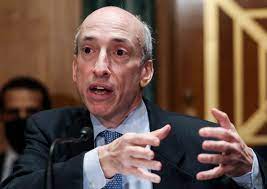Gary Gensler, the chair of the U.S. Securities and Exchange Commission (SEC), has been a vocal critic of cryptocurrency. He has called for stricter regulations on the industry, and he has even said that he believes that all digital assets are securities.
Gensler’s stance on cryptocurrency has been met with criticism from some in the industry, who argue that he is stifling innovation. They say that his regulations are too burdensome and that they will make it difficult for new businesses to enter the market.
Others argue that Gensler is simply trying to protect investors from fraud and abuse. They say that his regulations are necessary to ensure the safety of the financial system.
The debate over Gensler’s stance on cryptocurrency is likely to continue for some time. It remains to be seen whether his regulations will have a positive or negative impact on the industry.
Here are some specific examples of how Gensler’s SEC has stifled innovation in the cryptocurrency industry:
- In December 2021, the SEC charged Ripple Labs, the company behind the cryptocurrency XRP, with selling unregistered securities. The charges have had a chilling effect on the cryptocurrency industry, as many companies are now hesitant to offer new products or services for fear of running afoul of the SEC.
- In March 2022, the SEC issued a guidance letter that said that decentralized finance (DeFi) projects could be subject to securities laws. This guidance has led to uncertainty in the DeFi industry, as many projects are now unsure whether they are allowed to operate.
Gensler’s SEC has also taken a number of other actions that have stifled innovation in the cryptocurrency industry. These actions include:
- Issuing subpoenas to cryptocurrency companies
- Holding meetings with cryptocurrency companies to discuss their business practices
- Sending letters to cryptocurrency companies warning them about potential violations of securities laws
Gensler’s actions have had a negative impact on the cryptocurrency industry. They have made it more difficult for new businesses to enter the market, and they have stifled innovation.



